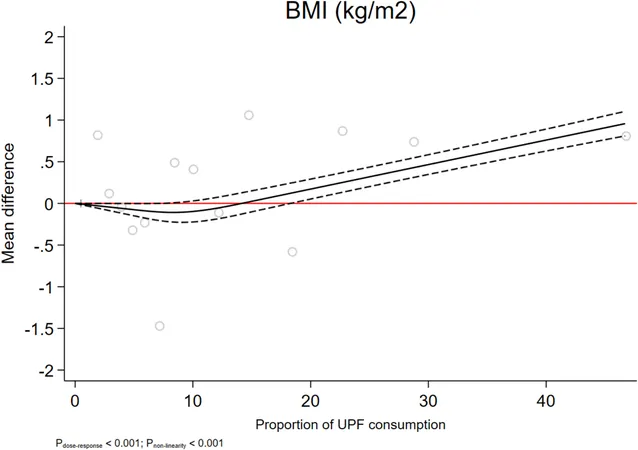
Unraveling the Mystery of Brain Fog: What Scientists Are Discovering
2025-04-07
Author: Ming
After surviving a COVID-19 infection, countless patients find themselves battling an unexpected adversary: brain fog. This condition often manifests as wandering attention, faltering memory, sluggishness, and an inability to think clearly—struggles that hinder everyday tasks.
Brain fog isn’t just a frustrating after-effect of COVID-19; research indicates it affects a staggering 20 to 65 percent of those suffering from long COVID—a variance that emphasizes our limited understanding of this complex symptom. While its association with COVID-19 popularized the term, brain fog was previously recognized within communities dealing with chronic illnesses such as fibromyalgia, myalgic encephalomyelitis (ME)/chronic fatigue syndrome, and lupus. Patients often experience cognitive cloudiness following chemotherapy or the use of pain medications, and it’s linked to various mental health disorders, including depression and schizophrenia.
Experts, such as neuropsychologist Jacqueline Becker from the Icahn School of Medicine at Mount Sinai, explain that patients report brain fog as a debilitating symptom of these chronic conditions, characterizing it by difficulty concentrating, forgetfulness, confusion, and cognitive sluggishness. Becker notes that for many, brain fog drastically affects their quality of life, thus prompting a need for scientific inquiry into its causes and treatments.
Defining Brain Fog: A Multifaceted Challenge
While there isn't a universally accepted definition for brain fog—and its clinical utility is debated—it is generally regarded as a collection of symptoms stemming from an underlying condition rather than a standalone diagnosis. Becker asserts that "brain fog" has become a catch-all term for various neurological symptoms linked to conditions like long COVID.
Despite its pervasive portrayal, distinguishing brain fog from measurable cognitive impairment can be challenging. Many patients report attention and memory issues, yet clinical assessments often reveal no significant deficits. This discrepancy can lead to frustration, particularly as some physicians may dismiss brain fog as entirely psychological, a perspective that Becker urges the medical community to challenge.
The causes of brain fog are likely varied, which complicates treatment strategies. Recent discoveries suggest that neuroinflammation—an overactive immune response—may play a central role. Research indicates that COVID-19 can lead to long-term inflammation, impacting the brain's immune cells and neuronal growth, alongside the formation of autoantibodies that may attack healthy brain tissue. Alarmingly, these inflammatory processes might also decrease the size of critical brain structures, yielding lasting cognitive issues.
The Blood-Brain Barrier and Beyond
Recent studies, including one published in *Nature*, have shed light on brain fog, revealing that long COVID patients exhibited a compromised blood-brain barrier—a protective membrane that typically shields the brain from harmful substances. This permeability might allow detrimental agents to infiltrate the brain, exacerbating neuroinflammation and impairing cognitive functions.
While certain small studies have linked an impaired blood-brain barrier to autoimmune disorders, the size of these studies can limit conclusive results. The pursuit of understanding brain fog's biological underpinnings continues, with scientists investigating factors beyond inflammation. For instance, fluctuating hormone levels during menopause and thyroid deficiencies from hypothyroidism are being scrutinized for their contributions to cognitive changes.
Additionally, emerging research explores the gut-brain connection, suggesting that an imbalanced gut microbiome might correlate with brain fog symptoms. A study found that individuals with gastrointestinal disorders experienced brain fog, positing that gut health could influence cognitive outcomes.
Moving Forward: Clearing the Fog
Despite the various origins of brain fog, experts stress the potential for lifestyle changes to alleviate symptoms. Regular exercise, a balanced diet, and adequate sleep can play substantial roles in managing brain fog. Those enduring persistent or severe cognitive fog should consult health professionals to explore reversible factors such as sleep apnea or vitamin deficiencies.
Innovative treatments are on the horizon, with cognitive rehabilitation therapy—the "exercise for the brain"—offering promising benefits for those with measurable cognitive impairments. Some patients have reportedly found improvement through medications typically prescribed for ADHD, while studies are also examining the anti-inflammatory properties of antihistamines and other medications like famotidine.
In a bold exploration of treatment options, researchers are investigating intravenous immunoglobulin therapy to quell excessive immune responses in long COVID patients. Future studies may also look into immunotherapy applications typically used in oncology to ease brain fog symptoms.
Ultimately, while significant strides have been made in understanding brain fog, the medical community acknowledges the need for more comprehensive studies to sharpen the focus on this condition. As Becker puts it, rather than label it as a failure to articulate, the ongoing investigation of brain fog may ultimately lead to a clearer path toward treatment and relief for countless individuals grappling with its all-too-real effects.





 Brasil (PT)
Brasil (PT)
 Canada (EN)
Canada (EN)
 Chile (ES)
Chile (ES)
 Česko (CS)
Česko (CS)
 대한민국 (KO)
대한민국 (KO)
 España (ES)
España (ES)
 France (FR)
France (FR)
 Hong Kong (EN)
Hong Kong (EN)
 Italia (IT)
Italia (IT)
 日本 (JA)
日本 (JA)
 Magyarország (HU)
Magyarország (HU)
 Norge (NO)
Norge (NO)
 Polska (PL)
Polska (PL)
 Schweiz (DE)
Schweiz (DE)
 Singapore (EN)
Singapore (EN)
 Sverige (SV)
Sverige (SV)
 Suomi (FI)
Suomi (FI)
 Türkiye (TR)
Türkiye (TR)
 الإمارات العربية المتحدة (AR)
الإمارات العربية المتحدة (AR)